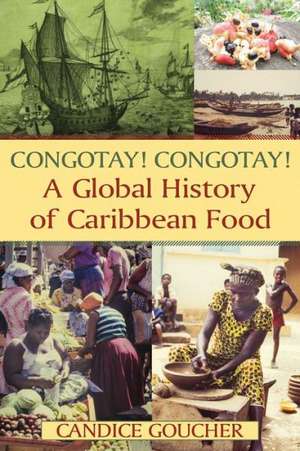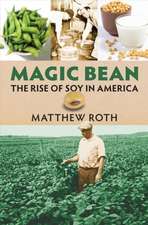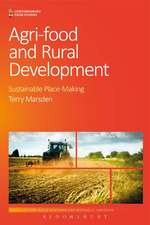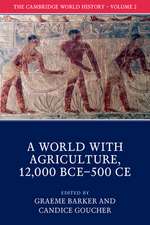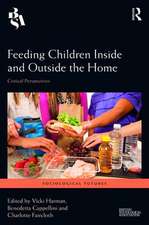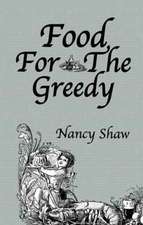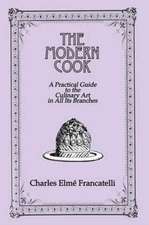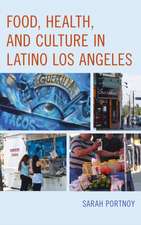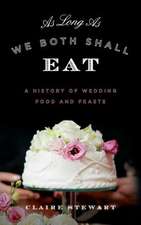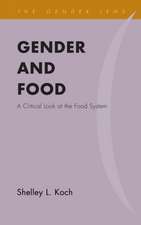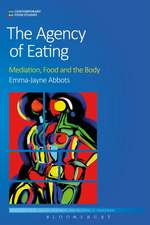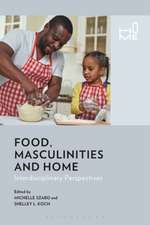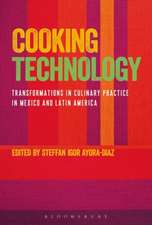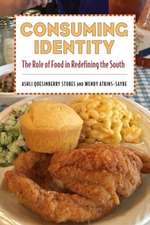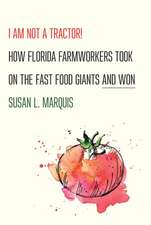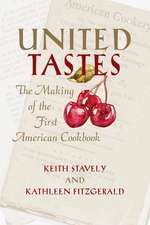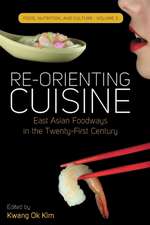Congotay! Congotay! A Global History of Caribbean Food
Autor Candice Goucheren Limba Engleză Hardback – 28 feb 2014
This book traces the pathways of migrants and travellers and the mixing of their cultures in the Caribbean from the Atlantic slave trade to the modern tourism economy. As an object of cultural exchange and global trade, food offers an intriguing window into this world. The many topics covered in the book include foodways, Atlantic history, the slave trade, the importance of sugar, the place of food in African-derived religion, resistance, sexuality and the Caribbean kitchen, contemporary Caribbean identity, and the politics of the new globalisation. The author draws on archival sources and European written descriptions to reconstruct African foodways in the diaspora and places them in the context of archaeology and oral traditions, performance arts, ritual, proverbs, folktales, and the children's song game "Congotay." Enriching the presentation are sixteen recipes located in special boxes throughout the book.
| Toate formatele și edițiile | Preț | Express |
|---|---|---|
| Paperback (1) | 411.42 lei 6-8 săpt. | |
| Taylor & Francis – 27 dec 2013 | 411.42 lei 6-8 săpt. | |
| Hardback (1) | 1110.74 lei 6-8 săpt. | |
| Taylor & Francis – 28 feb 2014 | 1110.74 lei 6-8 săpt. |
Preț: 1110.74 lei
Preț vechi: 1354.56 lei
-18% Nou
Puncte Express: 1666
Preț estimativ în valută:
212.61€ • 231.02$ • 178.71£
212.61€ • 231.02$ • 178.71£
Carte tipărită la comandă
Livrare economică 21 aprilie-05 mai
Preluare comenzi: 021 569.72.76
Specificații
ISBN-13: 9780765642158
ISBN-10: 0765642158
Pagini: 264
Dimensiuni: 152 x 229 x 20 mm
Greutate: 0.5 kg
Ediția:1
Editura: Taylor & Francis
Colecția Routledge
Locul publicării:Oxford, United Kingdom
ISBN-10: 0765642158
Pagini: 264
Dimensiuni: 152 x 229 x 20 mm
Greutate: 0.5 kg
Ediția:1
Editura: Taylor & Francis
Colecția Routledge
Locul publicării:Oxford, United Kingdom
Public țintă
UndergraduateCuprins
List of Illustrations and Map
List of Recipes
Preface
Introduction: The Creole Continuum of Foodways
Creole Culture in the Caribbean Crucible
Creole Cuisine
A Global Historical Narrative
1. Gastronomic Voyages: Magical Foods of the Atlantic World Gastronomic Voyages In the Wake of Columbus Fishing African Shores Sailing with Salted Cod African Salt Production Caribbean Salt Production Maritime Encounters The First Voyagers: Indigenous Cuisines Fishing the Prehistoric Caribbean Early European Chroniclers Magical Fruits of Paradise
Cooking with Salt Cod Portuguese Bacalhau Caribbean Salt Fish Pepper Pots
Along the Creole Continuum
Preserving Food and Flavor Jerked Meats Marinades Tasting Modernity
2. From African Kitchens: Food and the Atlantic Slave Trade
The Transatlantic Slave Trade
African Foodways Remembered Early Food Production in Africa Trading Foods and Beliefs Foods Making Meanings
African-European Coastal Encounters Culinary Exchanges The Cook Who Would Be King Slavery, Food, and Hunger
Foods of the Middle Passage
Saltwater Slaves and Cannibals
Domination and Resistance
Foodways of the African Homeland Arrive in the Caribbean Anancy the Spider-Cook One Day, One Day, Congotay The Enslaved African's Kitchen Rice and Provisions Coconuts, Corn, "and Plantains Make It Good" Excavating African Continuities
Meals in the Great House
Taverns, Punch Houses, and Garrisons
The African-Caribbean Continuum
3. Devil-King Sugar: Hierarchies of Caribbean Foodways
Devil-King Sugar
Sugar's History
Expanding Caribbean Sugar Production Copper Cauldrons Sugar and Labor Sugar and Caribbean Cultural Innovations Cannes Brulees: Performing the History of Sugar Cooking with Sugar Indentured Labor: Asian Contributions to Caribbean Culture and Cuisine Transporting Cuisines Ancient Foodways, New Borrowings Finding East Indian Identity Chinese Immigration Caribbean Curry and Roti
Gifts of Sugar
Drinking Sugar Distilled Spirits Kill-Devil Hot and Cold Spiced Drinks Sugar and the Caribbean Body
4. From Poisoned Roots: Feeding Power and Resistance
Food as Domination and Resistance Poisons and Power Obeah and War: Planting Resistance The Marketplace
Feeding the Ancestors and Spirits African Food Practices and Beliefs Gourmet Gods Fasting and Feasting: Christmas and Other Holidays I-tal Foods of the Rastafarians Asian-Caribbean Religious Foods Hidden at the Hearth
5. For the Love of Food: Sexuality and the Caribbean Kitchen
Food and Family in the Caribbean
Gender and the Caribbean Kitchen Demography and Gender Binary Divides Gendered Space Gendered Transmission of Knowledge Liming Food and Procreation Aphrodisiacs Callaloo Potent Food and Drink Cooking Transgressions
Dangerous Cooking, Dangerous Foods
Dangerous Dining
The Silence and Sounds of Food
Global Food Fusion in Caribbean History
6. Caribbean Hunger: Food, Politics, and Globalization
Feasts and Famines Harvest Feasts Funerary Foods Women and Proverbial Hunger Globalization and Food Culinary Travels Medicine and Botanical Science Ice Apples and Banana Boats Caribbean Tourism Caribbean Cookbooks
Urban Cauldrons Caribbean Fast Food Postcolonial Government Interventions Scarcity and Hunger Changing Ecologies Taking Back the Land Food Memories and Globalization
A Conclusion in Which Anancy Makes Dinner
Bibliography
Index
About the Author
List of Recipes
Preface
Introduction: The Creole Continuum of Foodways
Creole Culture in the Caribbean Crucible
Creole Cuisine
A Global Historical Narrative
1. Gastronomic Voyages: Magical Foods of the Atlantic World Gastronomic Voyages In the Wake of Columbus Fishing African Shores Sailing with Salted Cod African Salt Production Caribbean Salt Production Maritime Encounters The First Voyagers: Indigenous Cuisines Fishing the Prehistoric Caribbean Early European Chroniclers Magical Fruits of Paradise
Cooking with Salt Cod Portuguese Bacalhau Caribbean Salt Fish Pepper Pots
Along the Creole Continuum
Preserving Food and Flavor Jerked Meats Marinades Tasting Modernity
2. From African Kitchens: Food and the Atlantic Slave Trade
The Transatlantic Slave Trade
African Foodways Remembered Early Food Production in Africa Trading Foods and Beliefs Foods Making Meanings
African-European Coastal Encounters Culinary Exchanges The Cook Who Would Be King Slavery, Food, and Hunger
Foods of the Middle Passage
Saltwater Slaves and Cannibals
Domination and Resistance
Foodways of the African Homeland Arrive in the Caribbean Anancy the Spider-Cook One Day, One Day, Congotay The Enslaved African's Kitchen Rice and Provisions Coconuts, Corn, "and Plantains Make It Good" Excavating African Continuities
Meals in the Great House
Taverns, Punch Houses, and Garrisons
The African-Caribbean Continuum
3. Devil-King Sugar: Hierarchies of Caribbean Foodways
Devil-King Sugar
Sugar's History
Expanding Caribbean Sugar Production Copper Cauldrons Sugar and Labor Sugar and Caribbean Cultural Innovations Cannes Brulees: Performing the History of Sugar Cooking with Sugar Indentured Labor: Asian Contributions to Caribbean Culture and Cuisine Transporting Cuisines Ancient Foodways, New Borrowings Finding East Indian Identity Chinese Immigration Caribbean Curry and Roti
Gifts of Sugar
Drinking Sugar Distilled Spirits Kill-Devil Hot and Cold Spiced Drinks Sugar and the Caribbean Body
4. From Poisoned Roots: Feeding Power and Resistance
Food as Domination and Resistance Poisons and Power Obeah and War: Planting Resistance The Marketplace
Feeding the Ancestors and Spirits African Food Practices and Beliefs Gourmet Gods Fasting and Feasting: Christmas and Other Holidays I-tal Foods of the Rastafarians Asian-Caribbean Religious Foods Hidden at the Hearth
5. For the Love of Food: Sexuality and the Caribbean Kitchen
Food and Family in the Caribbean
Gender and the Caribbean Kitchen Demography and Gender Binary Divides Gendered Space Gendered Transmission of Knowledge Liming Food and Procreation Aphrodisiacs Callaloo Potent Food and Drink Cooking Transgressions
Dangerous Cooking, Dangerous Foods
Dangerous Dining
The Silence and Sounds of Food
Global Food Fusion in Caribbean History
6. Caribbean Hunger: Food, Politics, and Globalization
Feasts and Famines Harvest Feasts Funerary Foods Women and Proverbial Hunger Globalization and Food Culinary Travels Medicine and Botanical Science Ice Apples and Banana Boats Caribbean Tourism Caribbean Cookbooks
Urban Cauldrons Caribbean Fast Food Postcolonial Government Interventions Scarcity and Hunger Changing Ecologies Taking Back the Land Food Memories and Globalization
A Conclusion in Which Anancy Makes Dinner
Bibliography
Index
About the Author
Recenzii
*** Winner of the Gourmand World Award for best book on Caribbean cuisine and culture 2015 ***
"This excellent book introduces Caribbean history to world historians in a truly delightful way. Using food as a way into a multitude of world historical processes, from enslavement to resistance, from sexuality to globalization, Candice Goucher expertly cooks up the perfect regional history of Caribbean social life. Replete with modern and historical recipes, this book ought to be required reading for anyone with an interest in either the Caribbean or in food (and the recipes are simple too!)." -- Alan Karras, University of California, Berkeley
"This richly textured and lively written volume offers profound insights into the significance of food in world history and human experience, making me hungry for Caribbean food." -- Yong Chen, University of California, Irvine
"As a world historian I appreciate her attention to cultural detail on both sides of the Atlantic, and her elegant embrace of the histories of women and ordinary people as active participants in the construction of regionalized and global identities through the production and consumption of food. As a Latin American historian I appreciate her success in communicating the key notions of cultural interaction and blending to the world historical community. Finally, as a chef I appreciate the historical recipes and stories that lay behind that most basic of human activities: cooking and eating." -- Rick Warner, Wabash College
"Candice Goucher brings us a fascinating and compelling read. The scope of her work borders on remarkable. Beginning long before the middle passage, she peels back the layers and the cross-hatchings of cultures that created the foods of West African peoples. But the Caribbean is her focus and her story is not one we've heard before. ... Read Congotay! Congotay! for the sheer pleasure of discovery." -- Lynne Rossetto Kasper, Host, The Splendid Table from American Public Media
"Lyrically written and thoroughly engrossing, Congotay! Congotay! convincingly places foodways at the center of conversations about language, material culture and gender. By intertwining her own extensive research with a masterful synthesis of current scholarship on African disaporic cultural exchanges and globalization, Goucher delivers a significant global story in this marvelous history of Caribbean households." -- Laura Mitchell, University of California, Irvine
"Goucher provides a comprehensive history of Caribbean food in this slim volume. This is the first book about Caribbean cuisine focusing on the peoples of multiple countries who met on these islands and intermingled through forced circumstance. Not only does Goucher cover the major ingredients and dishes, she also addresses the effects of the cod fishing industry, slavery, the sugar industry, and Chinese and Indian immigration on the establishment of this multicultural cuisine. The book's strength is the author's use of primary sources to reconstruct African foodways in the Caribbean and their manifestations in storytelling, music, folklore, and children's games. Historians, anthropologists, and culinarians will appreciate this book. Highly recommended. All academic, professional, and general collections." -- Choice
"Food is obviously the focus of this book, and Goucher's enthusiasm for the subject flows through every page. Recipes for everything from pepper-pots to mojitos are included, as are more general descriptions of countless additional foods. But her use of food as an entry point to crucial themes like imperialism, slavery, migration, gender, sexuality, resistance, and globalization is extremely significant. Her knowledge of the scholarly debates on these subjects is impressive, and she makes a number of important contributions." -- Dave Eaton, Grand Valley State University
"In Congotay! Congotay! the subject matter is treated respectfully and honestly. It is an anthropological history that manages to avoid an overtly anthropological gaze. The book weaves socio-historical complexities of race, ethnicity, and class while managing to maintain its focus on the Caribbean and frankly the dominant African and Asian cultural and culinary influences. It is a welcome addition to foodways studies literature on Caribbean food, globalization, and colonialism and will be accessible and engaging for everyone from students to advanced researchers." -- Rachel Finn, Digest: a Journal of Foodways and Culture
"This excellent book introduces Caribbean history to world historians in a truly delightful way. Using food as a way into a multitude of world historical processes, from enslavement to resistance, from sexuality to globalization, Candice Goucher expertly cooks up the perfect regional history of Caribbean social life. Replete with modern and historical recipes, this book ought to be required reading for anyone with an interest in either the Caribbean or in food (and the recipes are simple too!)." -- Alan Karras, University of California, Berkeley
"This richly textured and lively written volume offers profound insights into the significance of food in world history and human experience, making me hungry for Caribbean food." -- Yong Chen, University of California, Irvine
"As a world historian I appreciate her attention to cultural detail on both sides of the Atlantic, and her elegant embrace of the histories of women and ordinary people as active participants in the construction of regionalized and global identities through the production and consumption of food. As a Latin American historian I appreciate her success in communicating the key notions of cultural interaction and blending to the world historical community. Finally, as a chef I appreciate the historical recipes and stories that lay behind that most basic of human activities: cooking and eating." -- Rick Warner, Wabash College
"Candice Goucher brings us a fascinating and compelling read. The scope of her work borders on remarkable. Beginning long before the middle passage, she peels back the layers and the cross-hatchings of cultures that created the foods of West African peoples. But the Caribbean is her focus and her story is not one we've heard before. ... Read Congotay! Congotay! for the sheer pleasure of discovery." -- Lynne Rossetto Kasper, Host, The Splendid Table from American Public Media
"Lyrically written and thoroughly engrossing, Congotay! Congotay! convincingly places foodways at the center of conversations about language, material culture and gender. By intertwining her own extensive research with a masterful synthesis of current scholarship on African disaporic cultural exchanges and globalization, Goucher delivers a significant global story in this marvelous history of Caribbean households." -- Laura Mitchell, University of California, Irvine
"Goucher provides a comprehensive history of Caribbean food in this slim volume. This is the first book about Caribbean cuisine focusing on the peoples of multiple countries who met on these islands and intermingled through forced circumstance. Not only does Goucher cover the major ingredients and dishes, she also addresses the effects of the cod fishing industry, slavery, the sugar industry, and Chinese and Indian immigration on the establishment of this multicultural cuisine. The book's strength is the author's use of primary sources to reconstruct African foodways in the Caribbean and their manifestations in storytelling, music, folklore, and children's games. Historians, anthropologists, and culinarians will appreciate this book. Highly recommended. All academic, professional, and general collections." -- Choice
"Food is obviously the focus of this book, and Goucher's enthusiasm for the subject flows through every page. Recipes for everything from pepper-pots to mojitos are included, as are more general descriptions of countless additional foods. But her use of food as an entry point to crucial themes like imperialism, slavery, migration, gender, sexuality, resistance, and globalization is extremely significant. Her knowledge of the scholarly debates on these subjects is impressive, and she makes a number of important contributions." -- Dave Eaton, Grand Valley State University
"In Congotay! Congotay! the subject matter is treated respectfully and honestly. It is an anthropological history that manages to avoid an overtly anthropological gaze. The book weaves socio-historical complexities of race, ethnicity, and class while managing to maintain its focus on the Caribbean and frankly the dominant African and Asian cultural and culinary influences. It is a welcome addition to foodways studies literature on Caribbean food, globalization, and colonialism and will be accessible and engaging for everyone from students to advanced researchers." -- Rachel Finn, Digest: a Journal of Foodways and Culture
Descriere
Since 1492, the distinct cultures, peoples, and languages of four continents have met in the Caribbean and intermingled in wave after wave of post-Columbian encounters, with foods and their styles of preparation being among the most consumable of the converging cultural elements.
This book traces the pathways of migrants and travelers and the mixing of their cultures in the Caribbean from the Atlantic slave trade to the modern tourism economy. As an object of cultural exchange and global trade, food offers an intriguing window into this world. The many topics covered in the book include foodways, Atlantic history, the slave trade, the importance of sugar, the place of food in African-derived religion, resistance, sexuality and the Caribbean kitchen, contemporary Caribbean identity, and the politics of the new globalization. The author draws on archival sources and European written descriptions to reconstruct African foodways in the diaspora and places them in the context of archaeology and oral traditions, performance arts, ritual, proverbs, folktales, and the children's song game "Congotay." Enriching the presentation are sixteen recipes located in special boxes throughout the book.
This book traces the pathways of migrants and travelers and the mixing of their cultures in the Caribbean from the Atlantic slave trade to the modern tourism economy. As an object of cultural exchange and global trade, food offers an intriguing window into this world. The many topics covered in the book include foodways, Atlantic history, the slave trade, the importance of sugar, the place of food in African-derived religion, resistance, sexuality and the Caribbean kitchen, contemporary Caribbean identity, and the politics of the new globalization. The author draws on archival sources and European written descriptions to reconstruct African foodways in the diaspora and places them in the context of archaeology and oral traditions, performance arts, ritual, proverbs, folktales, and the children's song game "Congotay." Enriching the presentation are sixteen recipes located in special boxes throughout the book.
